English language points
2019新人教高中英语必修一unit1language points单元词汇句型教案
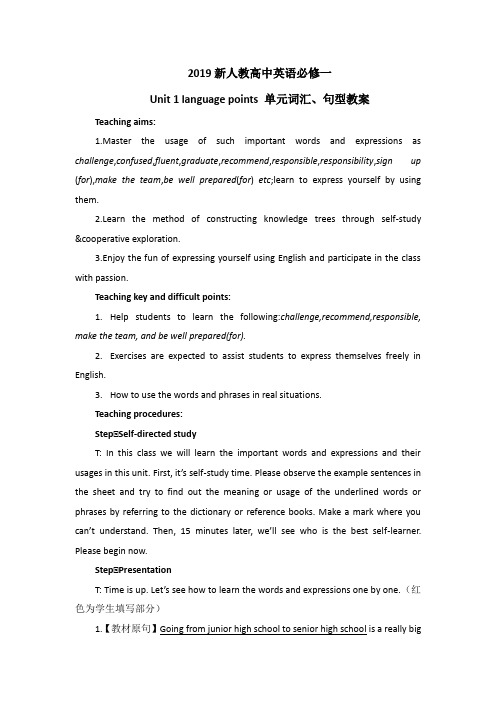
2019新人教高中英语必修一Unit 1 language points 单元词汇、句型教案Teaching aims:1.Master the usage of such important words and expressions as challenge,confused,fluent,graduate,recommend,responsible,responsibility,sign up (for),make the team,be well prepared(for) etc;learn to express yourself by using them.2.Learn the method of constructing knowledge trees through self-study &cooperative exploration.3.Enjoy the fun of expressing yourself using English and participate in the class with passion.Teaching key and difficult points:1.Help students to learn the following:challenge,recommend,responsible, make the team, and be well prepared(for).2.Exercises are expected to assist students to express themselves freely in English.3.How to use the words and phrases in real situations.Teaching procedures:StepⅠSelf-directed studyT: In this class we will learn the important words and expressions and their usages in this unit. First, it’s self-study time. Please observe the example sentences in the sheet and try to find out the meaning or usage of the underlined words or phrases by referring to the dictionary or reference books. Make a mark where you can’t understand. Then, 15 minutes later, we’ll see who is the best self-learner. Please begin now.StepⅠPresentationT: Time is up. Let’s see how to learn the words and expressions one by one.(红色为学生填写部分)1.【教材原句】Going from junior high school to senior high school is a really bigchallenge.从初中过渡到高中真是一项巨大的挑战。
外研版必修5 Module 1 British and American English Language points
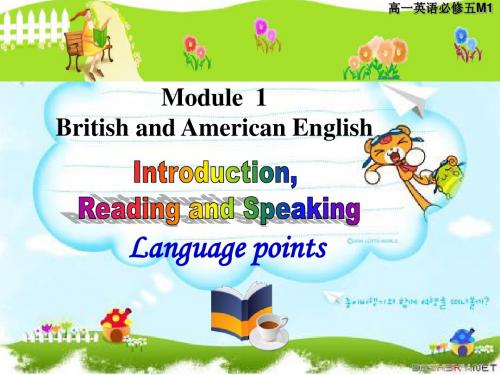
obvious 3. The first and most ______way is in the vocabulary.首先, 最为明显的方面是在词汇方面。 obvious adj. 显然的; 显而易见的 obviously adv. be obvious to sb. 对某人来说很清楚 It is obvious that… 很显然的… 1) 每个人都能看出他很失望. It is obvious to all that he is very disappointed. 2) 很显然他在撒谎. It is obvious that he is lying.
和……一样 与……有很多共同 之处 与……没多少/没有 共同之处 老百姓/常识 常犯的错误 为了共同利益 (英国) 普通法 共有,共同的
make much of a difference _________a whether 2. It doesn’t ____________________ teacher speaks British or American English. 老师是讲英国英语还是美国英语 是没有多大区别的。 1. 转学对我的一生有重大影响。 Changing schools made a big difference to my life. 2. 这场雨对比赛没什么影响。 The rain didn't make much difference to the game. 3. 你能否得到这工作与你的年龄无关。 Your age shouldn't make any difference to whether you get the job or not. make a, no, some, much, a lot of, etc difference to/in sb /sth 有(没有,一些,很多等) 作用,影响,关系。
Unit 4 Language points知识点课件课件高中英语人教版选择性必修第一册

para.3
8. employ v. 使用,雇佣 n. employment
unemployment employer employee
9. interpret v. 理解,翻译(口译) n. 口译人员 interpreter
interpret ... into ... 把… 翻译成 ... interpret… as … 把… 理解为…
para.4
by contrats
11. favour vt 赞成,喜欢 n. (approval)
adj. favourite favourable 赞同的,有利的
in favour of 支持,赞成 favour doing sth. 喜欢做某事 do sb a favour 帮助某人
Task 1
para.2
3. vary v. 变化,变化
n. variety
a variety of = varities of = various
adj. various
vary in ... 在 …方面不同
vary from ... to ... 从 ... 到 ... 不同
vary with ... 伴随 …而变化
should surf the Internet. 2. The chairman has also given his __a_p_p__ro__v_a_l__ (approve) for an investigation
into the case. 3.(用于申请信)如果我的申请能得到您的批准,我将不胜感激。
6. approve of n. approval
vi. 赞成,同意 vt. 批准,通过
Task 2
拓展: 动词+al 变为 名词 approve→approval arrive→arrival
WeleUnitLanguagePoints知识点2讲义高中英语人教版(1)

Wele UnitLanguage Points 2Period 4 Discovering Useful Structures and Listening and Talking1.Tom is looking forward to meeting the new exchange student. Tom 期待着和新来的交换生见面。
forward/forwards (adv.) 向前;前进(adj.) 向前的;前进的I saw him step forward momentarily but then hang back, nervously massaging his hands.我看到他向前走了片刻,然后却退缩不前,忐忑不安地搓着手。
Let anyone who has guts step forward. 有种的站出来。
I hope you can accept our invitation/consider my suggestion. Looking forward to your (early) reply.我希望你能接受我们的邀请/考虑我的建议。
盼望你的(早日)回复。
put forward a suggestion 提出建议词义关联:backward(adj./adv.) 向后的/地upward(adj.) 向上的;上升的downward(adj.) 向下的;下降的2.For Tom, that dream has e true.= For Tom, he has realized that dream.对于Tom来说,那个梦想已经成真了。
3.And, after a long day of study, he likes to watch the sun go down and wait for the stars to e out.并且,经过一整天的学习,他喜欢看太阳下山然后等着星星出来。
新教材人教版高中英语必修一 Unit 2 Language points课件
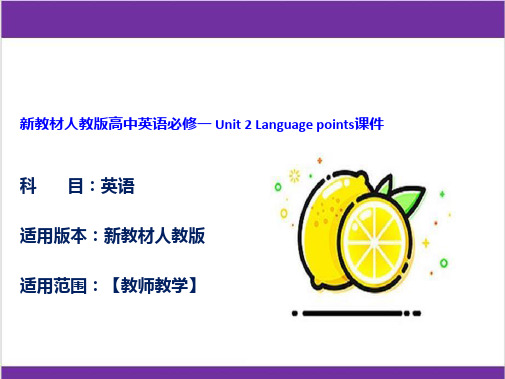
make up with sb. 与某人和解
第十九页,共二十七页。
【语境应用】翻译句子。
我们编了一个故事。这个故事由三个部分组成。其 中之一是关于一个人如何弥补他的过失的。
We make up a story. The story is made up of three parts, one of which is about how a man makes
2. Recognise text type recognise vt. to know who someone is or what
something is, because you have seen, heard, experienced, or learned about them in the past 辨别出;承认;认可
第十一页,共二十七页。
【归纳】 admire sb. for sth. 因某事而钦佩某人
【拓展】 admiration n. 赞美; 钦佩 express/ have admiration for sb./ sth. (表示) 羡慕/ 钦佩某人/ 物 with/ in admiration 钦佩地
第三页,共二十七页。
【语境应用】根据汉语意义完成句子。
1) 她是个优秀的教师,能够管好课堂纪律。
She's a good teacher who ___h_a_s_c_o_n_t_r_o_l_ofher class.
2) “你需要帮忙吗?”“不用,已经搞定了,谢谢。”
‘Do you need any help?’
up his mistakes.
第二十页,共二十七页。
Module_1_unit1_language_points 八年级英语上第一模块第一单元
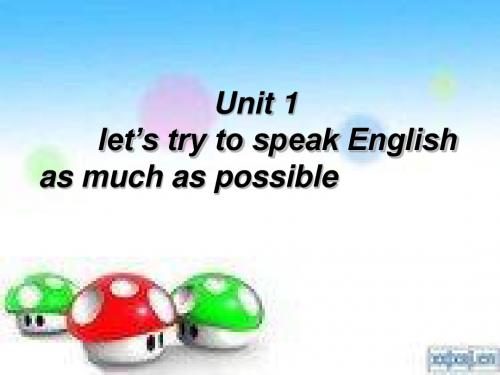
1. It’s very interesting to learn English. To learn English is very interesting. 2. It’s my pleasure to give you a hand. 【经典背诵】 1.It’s better to give than to receive. 2.It’s easier to say than to do. 3.It’s a good idea to take a deep breath when you are nervous. • It is +adj (for sb ) to do sth
We should always speak English in class.
• should 情态动词,意为“应该”,表示建 议,责任或义务。should 可用于各种人称, 后跟动词原形。 • We should respect our parents. • You should tell him this good news.
• talk about sb / sth 意为“讨论,谈论” 【译一译】 Jim and Tom are talking about their school and old classmates.
a way /ways to do sth / of doing sth
Do you know some good ways to learn English ? 做某事的好方法
Language points
• work in pairs.结对练习 pairs 是名词pair 的复数形式。pair在此处用 作可数名词,意为“两个人,一对”。In pairs 意为“成双的,成对的。” in groups Let’s play the games in pairs. 【拓展】a pair of 意为“一双/副/把……” a pair of shoes / glasses. 【想一想】还有那些可以用pair 来修饰的名 词? • trousers gloves scissors socks
外研社高中英语必修一第二单元developing ideas--language points学案
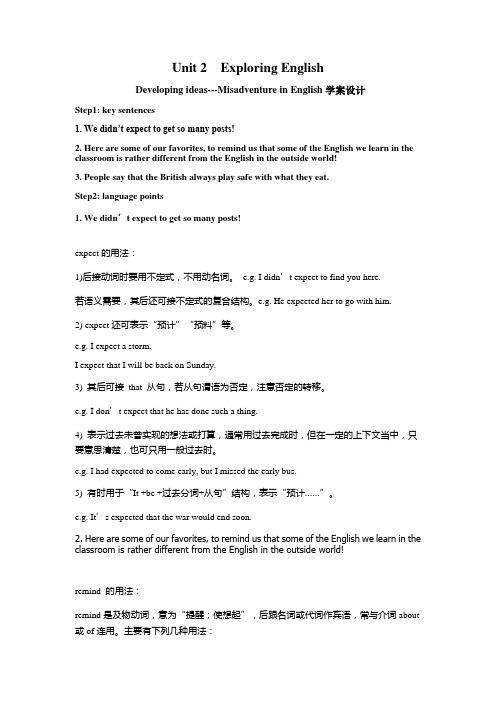
Unit 2 Exploring EnglishDeveloping ideas---Misadventure in English学案设计Step1: key sentences1. We didn’t expect to get so many posts!2. Here are some of our favorites, to remind us that some of the English we learn in the classroom is rather different from the English in the outside world!3. People say that the British always play safe with what they eat.Step2: language points1. We didn’t expect to get so many posts!_____________________________________________________________________ expect的用法:1)后接动词时要用不定式,不用动名词。
e.g. I didn’t expect to find you here.若语义需要,其后还可接不定式的复合结构。
e.g. He expected her to go with him.2)expect还可表示“预计”“预料”等。
e.g. I expect a storm.I expect that I will be back on Sunday.3) 其后可接that 从句,若从句谓语为否定,注意否定的转移。
e.g. I don’t expect that he has done such a thing.4) 表示过去未曾实现的想法或打算,通常用过去完成时,但在一定的上下文当中,只要意思清楚,也可只用一般过去时。
高一英语必修二M2U2project-language points-yi-课文全文翻译
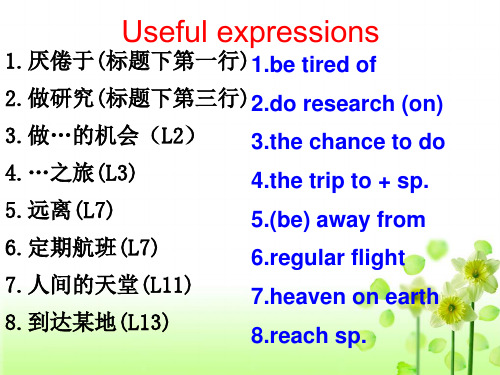
3. His poems and articles reflect his care for country life. 他的诗句和文章反映出了他对乡村生活 的关注。 4. Be quiet! I have to reflect on what has happened so far. 安静点!我必须认真思考到现在为止发 生了什么。
• What the weather is like • 19.The weather changes so quickly that people say you can experience four seasons in one day. • 香格里拉天气多变,以至于有人说,你可 以在一天里经历四季。 • 20.The best times to visit Shangri-la are spring and autumn when the temperature is at its mildest. • 前往香格里拉旅游的最佳时间是春季和秋 季,这两个季节气温最为温暖舒适。
Useful expressions
1.厌倦于(标题下第一行)1.be tired of
2.做研究(标题下第三行)2.do research (on)
3.做„的机会(L2) 4.„之旅(L3) 5.远离(L7) 6.定期航班(L7) 7.人间的天堂(L11) 8.到达某地(L13) 3.the chance to do
• 11.Many years after the book was published, some people realized that the Shangri-la of the novel was a perfect match for ZhongDian in Yunnan Province, China. • 此书出版许多年后,一些人发现,小说中 的香格里拉与中国云南省中甸完全吻合。
高一英语牛津版必修2第2单元language points
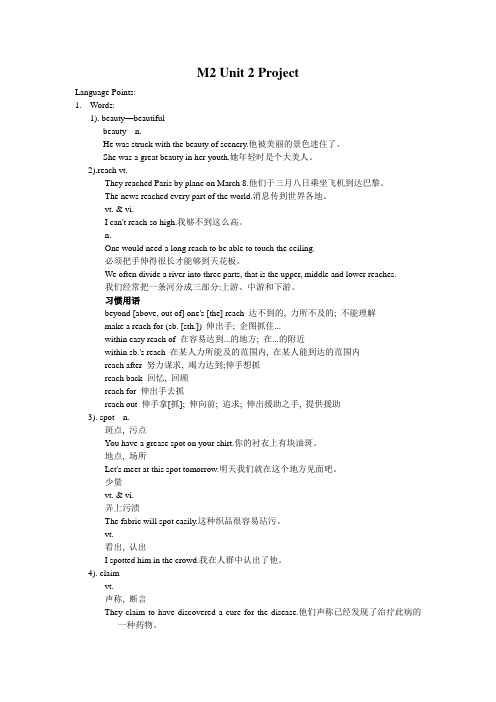
M2 Unit 2 ProjectLanguage Points:1.Words:1). beauty—beautifulbeauty n.He was struck with the beauty of scenery.他被美丽的景色迷住了。
She was a great beauty in her youth.她年轻时是个大美人。
2).reach vt.They reached Paris by plane on March 8.他们于三月八日乘坐飞机到达巴黎。
The news reached every part of the world.消息传到世界各地。
vt. & vi.I can't reach so high.我够不到这么高。
n.One would need a long reach to be able to touch the ceiling.必须把手伸得很长才能够到天花板。
We often divide a river into three parts, that is the upper, middle and lower reaches.我们经常把一条河分成三部分:上游、中游和下游。
习惯用语beyond [above, out of] one's [the] reach 达不到的, 力所不及的; 不能理解make a reach for (sb. [sth.]) 伸出手; 企图抓住...within easy reach of 在容易达到...的地方; 在...的附近within sb.'s reach 在某人力所能及的范围内, 在某人能到达的范围内reach after 努力谋求, 竭力达到;伸手想抓reach back 回忆, 回顾reach for 伸出手去抓reach out 伸手拿[抓]; 伸向前; 追求; 伸出援助之手, 提供援助3). spot n.斑点, 污点You have a grease spot on your shirt.你的衬衣上有块油斑。
外研社必修一第二模块Language Points (共34张PPT)优秀课件

strict
(adj.) The father is strict with his son.
be strict with sb.(about sth.)
adv. strictly
n. strictness
strictly speaking严格说来
make sure
e.g. 1) Make sure that you take medicine according to the instructions.
She is such a lovely girl that everyone loves her. It was such fine weather that we wanted to go for a walk.
such… that… 如此……以至于……
such + a/an + adj.+ cn.(单数) + that…
(U)
to one’s amusement 令人感到好笑的是
amusement park
游乐园
to one’s amusement to one's surprise to one's belief
to one’s +n. 感到...
patient
(1) n.
(2) adj.
If we are patient with fishing, we can get lots of fish.
hate: dislike
~ doing 讨厌做某事〔习惯性的〕 ~ to do 不想/不愿做某事〔一次性的〕 ~ it when/if …
e.g. I hate it if I have to get up early. e.g. 我讨厌有人在寝室唱歌。
U2P2Languagepoints1

address their concerns 消除他们的顾虑
address
to think about a problem or a
situation and decide how you are going to deal
with it 设法解决;处理;对付
① How to address the issues? 如何解决这些问题? ② Your essay does not address the real issues. 你的论文没有论证实质问题。
③ That's not the right way to hold a pair of scissors. 那样拿剪刀不对。
④ This is the entrance to the park. 这是公园的入口。
9. After you have thought it through, explain your actions and feelings calmly, listen carefully, and address their concerns. 在你全面考虑之后,冷静地解释你的行为和感受, 仔细倾听,并消除他们的顾虑。
用result in 或result from的正确形式填空。 resulted in
resulted from
resulted from
4. When it all gets too much, your parents are often the first targets of your anger. 当这一切让你不堪重负时,父母常常会成为 你发泄愤怒的首选目标。
break through 作出新的重大发现;取得突破
live through 经历(灾难或其他困境)而幸存 look through 快速查看;浏览
a taste of English humor language pointsPPT课件
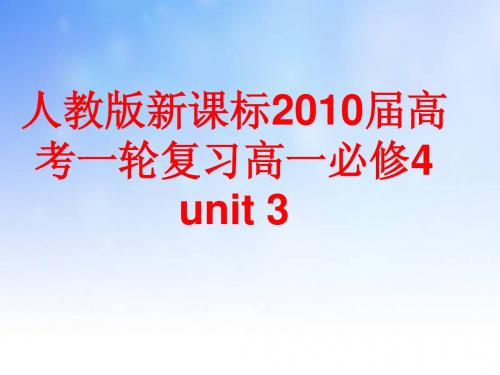
inspired confidence in his son. The father______________________________.
2. However, some actors can astonish us with the deep feelings they can inspire in us for a character they are playing.
然而,有些演员能用他们所演的角色在我 们身上鼓动起来的深深情感震撼我们。
5.成龙被邀请将在一部新动作片中担任主演,但他对剧本 不满意. star ______ in Jack Chan has been invited to ______ a new satisfied action movie, but he is not currently _____________ with the script. ______ 6.他们住在那间朝南的房子里. south facing ________. They lived in the room_______ 7.你听见有人在敲门么? knocking _______ at Do you hear someone _________ the door? 8.当时我的裙子被门夹住了. in got/was caught My skirt _______ _________ ________the door at
人教版新课标2010届高 考一轮复习高一必修4 unit 3
New words:
• • • • • • • slide skin cruel content astonish particular entertain • • • • • • • 滑动,滑行,幻灯片 皮肤,外壳 残酷的, 满足的,满意的 使惊讶 特殊的,特别的 使欢乐;款待
Language points知识要点
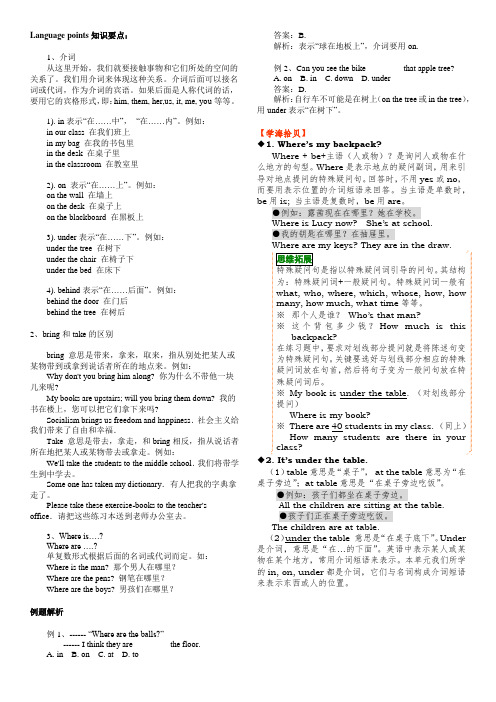
Language points知识要点:1、介词从这里开始,我们就要接触事物和它们所处的空间的关系了。
我们用介词来体现这种关系。
介词后面可以接名词或代词,作为介词的宾语。
如果后面是人称代词的话,要用它的宾格形式,即:him, them, her,us, it, me, you等等。
1). in表示“在……中”,“在……内”。
例如:in our class 在我们班上in my bag 在我的书包里in the desk 在桌子里in the classroom 在教室里2). on 表示“在……上”。
例如:on the wall 在墙上on the desk 在桌子上on the blackboard 在黑板上3). under表示“在……下”。
例如:under the tree 在树下under the chair 在椅子下under the bed 在床下4). behind表示“在……后面”。
例如:behind the door 在门后behind the tree 在树后2、bring和take的区别bring 意思是带来,拿来,取来,指从别处把某人或某物带到或拿到说话者所在的地点来。
例如:Why don't you bring him along? 你为什么不带他一块儿来呢?My books are upstairs; will you bring them down? 我的书在楼上,您可以把它们拿下来吗?Socialism brings us freedom and happiness.社会主义给我们带来了自由和幸福.Take 意思是带去,拿走,和bring相反,指从说话者所在地把某人或某物带去或拿走。
例如:We'll take the students to the middle school.我们将带学生到中学去。
Some one has taken my dictionary.有人把我的字典拿走了。
【原创】必修第一册unit5-Language points
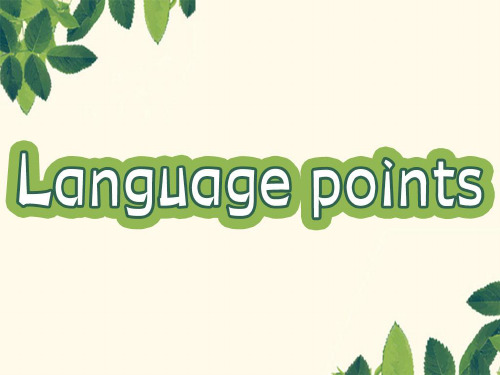
ill. ___我__们__没__有__意__识__到__他__的__病__情__很__严__重__。________
_______________________________________
3) I’d appreciate it if you would turn the
【归纳】
appreciate your help 感激你的帮助 appreciate (one’s) doing sth.
appreciate 感激(某人)做某事 I would appreciate it if… 如果……,我将不胜感激
【拓展】 appreciation n. 感激 【注意】 (1) appreciate后面只能接“事”作宾语,不
能接“人”作宾语。
(2) appreciate, hate, dislike, love, depend, rely on等后接宾语从句时,一般先加it, 再加宾语从句。
【语境应用】翻译句子。
1) You can’t really appreciate foreign
literature in translation. __看__翻__译__作__品__不__能__真__正__欣__赏__到__外__国__文__学__原__著___ __的__美__妙__之__处__。___________________________
system can be seen in the development of Chinese characters as an art form… 中国 人对其书写体系推崇备至,这体现在汉字 发展为一种艺术形式……
2019外研版高中英语必修三Unit1 Language points 知识点
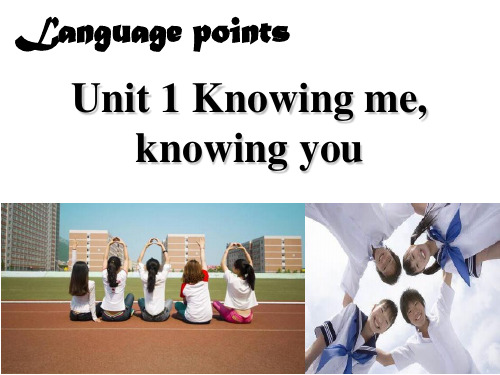
① They huddled(挤成一团) together to protect themselves from the wind.
他们挤在一起,免受风吹。
② Something must be done to protect the environment from being polluted.
诚实;老实;正直
① She answered all my questions with her usual honesty.
她像平常一样老老实实地回答了我的所有问题。
② His honesty is not in question.
他的诚实是毋庸置疑的。
honest adj. always telling the truth, and
4. Moreover, how would you feel if you discovered that the people closest to you had been hiding the truth from you?
此外,如果你发现你身边最亲近的人一直在向 你隐瞒真相,你会有什么感觉?
4.你为什么对我隐瞒的想法呢?
Why do you hide your thoughts from me?
5.女性怎样做才能使自己不得心脏病呢?
What can women do to protect themselves from heart disease?
Try to memorize these useful expressions.
Translate the following sentences into English.
1.诚实是一种美德(virtue)。
Unit 5 Language points 知识点课件高中英语人教版2019选择性必修第三册
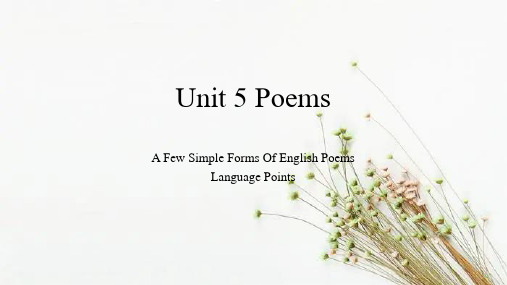
常用句型
• 1…but they are easy to learn and recite. 主语+be+adj.+to do ……是……的 Caution: a.主语是不定式to do的逻辑宾语,因此后面不能再加sth。
He is easy to persuade. b.To do中的动词如果是不及物动词的话,要加相应的介词,及物动 词的话则不需要。
The chair is comfortable to sit on. c.如果要指出不定式动作的发出者(不定式的逻辑主语)的话,在 to do 前加上for sb/sth。
This kind of job is easy for them to do.
2.With so many different forms of poetry to choose
4.The distinctive characteristics of poetry often include economical use …rhythm.
distinctive adj.独特的,与众不同的 distinctive feature 辨别属性;区别性特征 distinction区别;差别;特性;荣誉、勋章 distinctively特殊地;区别地
With nothing to do, she has to sleep.
英语语言点反思模板

Introduction:Reflecting on the English language points I have encountered and mastered is an essential part of my language learning journey. Through this reflection, I aim to identify my strengths, weaknesses, and areas for improvement. The following template will guide me through the process of analyzing and evaluating my English language proficiency.1. Introduction- Briefly introduce yourself and your current level of English proficiency.- Mention the purpose of this reflection.2. Grammar- Identify specific grammar rules or structures that you have recently learned or are currently studying.- Discuss any common mistakes you have made or continue to make in these areas.- Explain how you plan to overcome these mistakes and improve your grammar skills.3. Vocabulary- List the new vocabulary words or phrases you have learned recently.- Describe how you have incorporated these new words into your daily language use.- Reflect on any challenges you faced while learning these new words and how you addressed them.4. Pronunciation- Analyze your current pronunciation skills, focusing on vowels, consonants, and intonation.- Identify specific sounds or intonation patterns that you find difficult to master.- Share strategies you have employed to improve your pronunciationand any progress you have made.5. Listening Skills- Reflect on your listening skills, including understanding spoken English in various contexts (e.g., conversations, lectures, news broadcasts).- Identify areas where you struggle, such as following fast-paced speech or understanding idiomatic expressions.- Discuss techniques you have used to enhance your listening comprehension and any noticeable improvements.6. Reading Comprehension- Evaluate your reading comprehension skills, including understanding articles, books, and academic texts.- Identify any difficulties you encounter, such as skimming, scanning, or understanding complex sentences.- Share strategies you have employed to improve your reading comprehension and any progress you have made.7. Writing Skills- Assess your writing skills, focusing on coherence, organization,and grammar.- Identify common errors you make in your writing, such as sentence structure, word choice, or punctuation.- Describe how you plan to improve your writing skills, including seeking feedback and practicing regularly.8. Speaking Skills- Reflect on your speaking skills, including fluency, pronunciation, and vocabulary use.- Identify areas where you feel confident and areas where you still struggle.- Discuss techniques you have used to improve your speaking skillsand any progress you have made.9. Cultural Awareness- Discuss your understanding of English-speaking cultures and how it impacts your language learning.- Identify any cultural misunderstandings you have encountered and how you have addressed them.- Reflect on the importance of cultural awareness in languagelearning and how it can enhance your proficiency.10. Conclusion- Summarize the key points discussed in your reflection.- Set specific goals for your future language learning, focusing on areas where you identified weaknesses.- Express your commitment to continuous improvement and your dedication to mastering the English language.Remember, this template is a guide to help you structure your reflection. Feel free to modify or expand upon it to suit your individual needs and experiences.。
交际英语教案

交际英语教案New Person to Person (上册)Unit 7Focal Points:I Functions1.talking with seller2.asking for help and helping others3.finding some goods in a store4.asking the price and colorparing goodsII Sentence structure☜ Can/CouldCan I help you with something?☜ Count nounsa cup of coffee/ a movie ticket☜ Y es/ No questionsDo you have this in size…? Do you carry this in…? ☜ Determinesthis/ that/these/those☜Comparatives:bigger/loose/ brighterIII Pronunciation“r” in British English and American EnglishLanguage Points:I. Phraseon salecome in mediumlook aroundmetallic blueracing redtry sth. ontalk sb into sth.final examinationpotluck partylight bluegolf bagII. Sentence patternsExcuse me. Could you help me?Can I help you with something?Do you have this in size 10?How much is this ?Which hat do you like better?Why do you like the green hat better?It’s the wrong color.Unit 8:Focal Points:I. Functions☜ discussing menu☜ asking for others’ needs☜ explaining your needs☜ providing service☜ ordering the dishII. Sentence Structure☜ Future formsWill (have), be going to (have)☜ Contractions, with will and wouldI will have.☜ Quantifierssome/any/a piece of /an order of+noun III. Pronunciationweak reading of “would you”Language points:I. Phraseswhat kind ofgo aheadon the siderun outbe all outcare foran order ofbe fullIs that for here or to go?II. Sentence patternsWhat are going to have, Julie?Are you ready to order, miss?Could we have a few more minutes, please? What kind of dressing would you like? Would you care for anything to drink? Would you like me to get your coffee? Would you like anything else?Focal Points:I. Functions1. asking sb to do sth.2. asking sb to do sth complicated3. asking for help4. complaining indirectly5. accepting others’ apologyII. Sentence Structures☜ Would you mind+ gerundWould you mind lending me…?☜ Could you + simple form:Could I borrow…?☜ too+ adjectivetoo hotIII. Pronunciation“can”“can’t”Language Points:I. Phrasepick upHere you go.Here you are.ask for favour.do favournon-smokingbe glad to do sth.be sb’s faultsuntan lotionturn up the volumeworry aboutlunch hourrun out ofII. Sentence patternsDo you have an extra pencil?Could I borrow a tissue?Could I borrow a quarter?Do you think I could borrow 25 dollars until Tuesday? Excuse me. I have a problem with my room.I am very sorry about this.Focal Points:I. Functions1. Introducing yourself2. Getting to know others3. Clearing the misunderstanding4. Describing the past5. Talking about the lasting time of somethingII. Sentence structures☜ Past tense:I went to …/I traveled for…☜Past habitual:used to☜ Time expressions:for a while/ in1974/ (years) ago/when/right after/ that/ then/III. Pronunciationthe weak reading of “did you”Language Points:I. Phrasesmove aroundbe originally frombe fromgo to schoolgo to collegeright awaygrow upIt’s been ages.open a restauranthead chefused to do sth.I bet…Air ForceNobel PrizeII. Sentence PatternsDid you get a job right after college?That was when I was twenty-one.How long did you stay in California?What did you do after you left California?I used to hate cooking, but now I love it.Unit 11Focal Points:I. Functions1. asking others’ past experiences2. asking others’ opinions3. comparing citiesII. Sentence structures☜Present perfect:Have you ever been…?☜Simple past:What did you think of…? How was it?☜Comparatives:Montreal is more exciting than Ottawa.III. PronunciationWhere did you go last night? (The tone is going down) Language Points:I. Phraseson someone’s first tripI can’t wait.the day before yesterdayThat’s hard to say.Golden Gate BridgeWait a minute.art galleryII. Sentence PatternsHave you ever been to Japan?What did you think of Tokyo?What was the weather like?How is the weather?Unit 12Focal Points:I. Functions1. talking future plans2. talking future needs3. talking personal expectations4. talking the possible plans in the futureII. Sentence structures☜ Future with plan to /going to/ planning toWhat do you plan to do/are you going to do?☜Future with present progressiveWhat are you doing after that?☜Expressing possibilityI might go/I hope to goWill vs. Going toHow long will you be there?III. Pronunciationrhythm of : I would like to see a doctor Language Points:I. Phrasesthree months to gogo to collegemajor inget a degreetake it awayNew Y ear Resolutionquit smokinglose weighthealth clubMy pleasure.II. Sentence PatternsWhat do you plan to do after you graduate? How long will you be there?What do you want to do?What would you like to do?What do you hope will happen?Where do you think you will go?I might go to Mexico.New Person to Person (下册)Unit 1Focal PointsI. Functions1. starting a talk2. introducing yourselfII. Sentence Structures☞Y es/No questions:Don’t I know you form somewhere?☞ResponsesI am not sure.☞Tag questionsY ou went to Milton High School, didn’t you? ☞Review of to be:Louis, this is Max.☞Responses:It’s nice to meet you.III. PronunciationJointing reading: just got/ didn’t youLanguage PointsI. Phraseat the end of the month]a couple ofat firstwear glasseslunch hourbelong toget backbe afraid ofplay golfgo fishingII. Sentence patternsThis line is taking forever.I think we were in the same computer course.My name’s Paul.Do you play golf?I am glad to meet you.Unit 2Focal PointsI. Functions1. asking the location2. introducing yourself3. asking the way in the departmentII. Sentence Structures☞ wh- questionsWhere can you get…?☞ Preposition of locationIn the Shell Building/ past the park/after the hotel ☞Embedded questions:Could you tell me where the toy department is? ☞Y es/No questions:Is there a pharmacy in this mall?III. Pronunciation辅音连缀Language PointsI. Phraseget dresseda cup of coffeea pair of pantsdry cleanerget pictures developedcomputer gameII. Sentence patternsWhere can you get a pair of pants cleaned around here? Could you tell me where the toy department is? Where can I exchanged this computer game?I am looking for gloves for my sister.Is there a pharmacy in this mall?Unit 3Focal PointsI. Functions1. call sb. on the phone2. write down messages for sb,3. leave messages4. ask sth on the telephoneII. Sentence Structures☞CouldCould I speak to Helen?☞Y es/No questionsIs Helen there, please?☞Review of to beMy name is …☞ ResponsesAll right, go ahead.III. PronunciationThe stress of two or three or even more syllables. Language PointsI. Phrasehave a partybe freeright nowas soon asjust a momentcall backhalf an hourhold a lineleave a messagepress conferenceII. Sentence patternsCould I please speak to Helen?This is DannyI am sorry, he is not here.I will tell him to call Danny Silver at 3640107.Unit 4Focal PointsI. Functions1. finding out the problems2. providing suggestions3. advising othersII. Sentence Structures☞Predicate adjectives:It’s dangerous.☞ Gerundsovercrowding☞ Wh- questionsWhat can we do?What can we do about...?III. Pronunciation句中的重要信息要重读。
英语知识点总结 英文

英语知识点总结英文English is a global language that is spoken by millions of people all over the world. It is the official language of many countries and is also widely used as a second language in others. In this article, we will summarize the key knowledge points of the English language, covering grammar, vocabulary, and language skills.Grammar1. Parts of Speech: In English, there are eight parts of speech: nouns, pronouns, verbs, adjectives, adverbs, prepositions, conjunctions, and interjections. Each part of speech plays a specific role in a sentence, and it is important to understand their functions in order to communicate effectively.2. Tenses: English has 12 tenses, including simple present, present continuous, present perfect, present perfect continuous, simple past, past continuous, past perfect, past perfect continuous, simple future, future continuous, future perfect, and future perfect continuous. Understanding how and when to use each tense is crucial for accurate communication.3. Sentence Structure: English sentences typically follow a subject-verb-object (SVO) structure, although there are exceptions depending on the type of sentence. It is important to understand how to construct sentences correctly in order to convey meaning accurately.4. Articles: English has two articles, "a/an" and "the." Knowing when and how to use these articles is important for proper grammar and comprehension.Vocabulary1. Word Formation: English words can be formed through various processes such as affixation, compounding, and conversion. Understanding these processes can help learners expand their vocabulary and use words correctly in different contexts.2. Synonyms and Antonyms: Synonyms are words that have similar meanings, while antonyms are words that have opposite meanings. Building a strong vocabulary involves learning synonyms and antonyms to express ideas more precisely.3. Idioms and Phrasal Verbs: Idioms are expressions with meanings that are different from the literal meanings of the words used. Phrasal verbs are combinations of a verb and one or more particles (prepositions or adverbs) that have unique meanings. Learning idioms and phrasal verbs can help learners sound more natural and fluent in English.4. Word Families: Word families are groups of words that share the same root or base word, along with different prefixes and suffixes. Understanding word families can help learners expand their vocabulary and understand the meanings of new words more easily. Language Skills1. Listening: Listening is an important language skill that involves understanding spoken English in various contexts. It is important to practice listening to different accents and speech patterns in order to improve comprehension.2. Speaking: Speaking involves producing English sounds and words to communicate with others. Practicing pronunciation, intonation, and fluency is crucial for developing speaking skills.3. Reading: Reading in English helps build vocabulary, comprehension, and critical thinking skills. It is important to practice reading different types of texts, such as fiction, non-fiction, articles, and academic texts.4. Writing: Writing involves producing written English to convey ideas and information. Developing writing skills includes understanding and using different text types, organizing ideas logically, and using correct grammar and vocabulary.In conclusion, English knowledge points encompass grammar, vocabulary, and language skills that are essential for effective communication. By mastering these knowledge points, learners can improve their English proficiency and engage successfully in various social, academic, and professional contexts.。
- 1、下载文档前请自行甄别文档内容的完整性,平台不提供额外的编辑、内容补充、找答案等附加服务。
- 2、"仅部分预览"的文档,不可在线预览部分如存在完整性等问题,可反馈申请退款(可完整预览的文档不适用该条件!)。
- 3、如文档侵犯您的权益,请联系客服反馈,我们会尽快为您处理(人工客服工作时间:9:00-18:30)。
Translate:1.六岁的弟弟2.为……担忧3.一直4.步行去上学5.坐汽车6.体育课7.我过去常常不喜欢考试。
Compare:1.six-year-old / six years old This is a ___________ boy.The boy is _____________.2.worry about / be worried about 别担心他。
我们为他担心。
3.take the bus / by busHe goes to school _________.He _______________to school.1.I used to have so much time.We shouldn’t spend too much time on computer games.2.all day = the whole day 整天3.Then I go right home. ___________We use our right hands to hold chopsticks.___________I sit on the right of Lily.__________The UFO landed right in front of me.__________Your answer is right.____________ 4.5.6.7.8.9.10.I used to spend a lot of time playinggames with my friends, but now I just don’t have the time anymore.人+spend (spent)+time/money+ on sth. 人+spend(spent)+time/money+in doing 人+ pay(paid)+money+for sth.物+cost(cost)+ sb. + moneyIt takes sb. some time to do sth.not …any longer=not …any moreno longer位于句中be 动词之后,实义动词之前。
Translate:1.画画2.音乐课3.步行去上学4.体育课5.一直6.为……担忧7.一位八十岁的老奶奶8.坐汽车9.整天整夜10.上中学之前,我常常花许多时间和朋友玩游戏,但我就不再有那个时间了。
11.我买电脑花了五千元。
(1.2.3.4)12.我们不再是小孩子了。
(1.2.3)Dear Mary,I’m sorry to hear that you have some problems. Don’t worry about them. Let me help you. First of all, I think you should learn English by studying grammar and you’d better do more reading and writing to improve your English. As for watching TV, I think your mother is right. You should spend more time studying instead of watching TV. But you can persuade her to allow you to watch TV several times a week. I think it’s good for your study. You said you’re getting fatter and fatter. Why not eat more fruit and vegetables? You have to do more exercise. I hope my advice can really help you.Good luck to you!Yours,SueAnswer the following question.1.How old is Martin Murray?2.He used to be a “problem child”,what changed his life?3.Why did his mother have to work?4.Did his mother look after him well?5.Was he interested in studying?6.Who did he get into trouble with?7.Was his mother patient?8.In the end, what did she do? Anddid she give up trying to help him?9.Did Martin like the school?10.What did the head teacher say whenMartin wanted to leave the school?11.What did his mother tell him?12.Since his father died, he hasn’t beenafraid of being alone, has he?13.Has he changed? And how?14.How was he able to change?Underline these phrases as you read.1.引起很多麻烦2.一个问题小孩3.一次最近的谈话4.困难的多5.支付……的费用6.照顾7.尽可能的8.与某人发生纠纷9.最后10.做出一个艰难的决定11.送某人去某地12.令某人惊奇的是13.对……感到骄傲14.害怕独处15.使某人做某事16.对……注意17.最优秀的学生之一18.自我感觉良好19.我做的一切好事20.放弃做1.have trouble with sth.I have trouble with my pronunciation.have trouble in doing sth.I have trouble in pronouncing.get into trouble 陷入困境招致责罚I always got into trouble when I was young.in trouble 处于不幸,苦恼,困境中We should help the people in trouble.2.His mother couldn’t afford to payfor his education. afford to do 3.in the end = at last = finally 最后at the end of …(时间,地点)At the end of the novel the poor man died.4.It was necessary ___ him to talkwith his mother.It was wise ____him to talk with hismother.5.She told me that even though myfather was no longer with us, hewas watching me and would alwaystake pride in everything good I do.6.pay attention to对…注意look forwar d to 盼望+n./v.-ingbe/get used to 习惯于make a contribution to为…做贡献7.to one’s surprise 令某人吃惊的是be surprised to do 做…感到吃惊be surprised at 对…感到吃惊in surprise 吃惊地8.give up doing 放弃做喜不喜欢不介意,(enjoy, mind)想要训练莫放弃,(feel like, practice, give up)不禁值得去坚持,(can’t help, be worth, keep on )忙于完成最无益。
(be busy, finish)用die, dead, death填空1.He ________ two years ago.2.He has been _______ for two years.3.It’s two years since his father’s ___.用to one’s surprise, be surprised, insurprise填空4.He ________ to see his old friends.5.“Aren’t you a teacher?” He asked__.6.___________he passed the exam.7.他买不起一辆新车。
8.他小时候经常惹麻烦。
9.我父亲为我的学习而骄傲。
()10.我想帮爸爸戒烟。
1. The foods you eat could help with this problemhelp with sth.help sb. (to) do sth.My English teacher always help me to learn English.help sb. with sth.My English teacher always help me with my English.2.just = exactly 正好;恰好That’s just what I wanted.It’s just half past eight.仅仅;只是He is just a child.Just a moment.刚刚;刚才I’m just out of hospital.就是;就要(加强语气)I just don’t have the time.I just don’t enjoy parties.3. If I were you, I’d take a long walk before going to bed.while/when/before/after(介词) + n./v.-ingI keep my bedroom light on when I sleep.He will go abroad to study further after he finishes school.改为简单句4. be confident of + n. / v.-ing对……有信心be confident that+从句I’m confident of the English exam.I’m confident of passing the English exam.I’m confident that I can pass the English exam.5.be friends with sb. 延续性动词make friends with sb. 短暂性动词I’ve _______ a friend with Lily for a long time.根据首字母填空:1.I get n______ before taking a big exam.2.My deskmate always helps w____ my homework.3.If you don’t how to deal with the problem, you can ask your teacher for s________.4.Don’t take away anything from here without p_______.5.C_______ people aren’t afraid to speak in public.6.Boys never get tired. They are e________.7.My only w_____ is that I might fail to pass the exam.。
